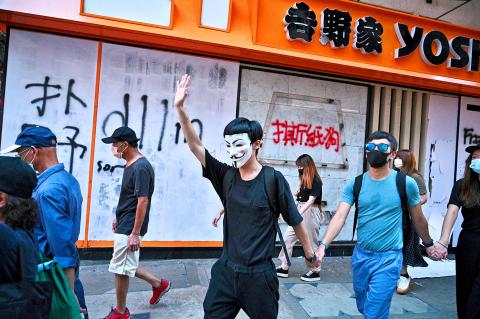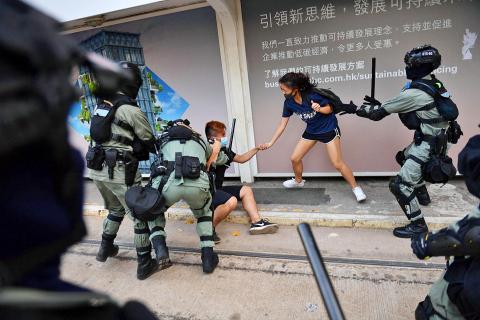All subway and train services were suspended, lines formed at the cash machines of shuttered banks and shops were closed as Hong Kong dusted itself off yesterday and then started marching again after another night of rampaging violence decried as “a very dark day” by Hong Kong Chief Executive Carrie Lam (林鄭月娥).
In a televised address broadcast as marchers in masks again took to the streets in defiance of her newly instituted ban on face coverings at rallies, a solemn Lam described Hong Kong as “semi-paralyzed” and in the grips of “unprecedented violence.”
The chief executive did not announce additional measures to quell increasing violence, beyond the ban criminalizing the wearing of masks at rallies that took effect at midnight.

Photo: AFP
She defended the legality of the measure denounced by government critics and demonstrators, and said that “to protect citizens’ daily lives and freedoms, I cannot allow the small minority of rioters to destroy that.”
“Everyone is worried and scared,” she said.
Many were fired up, too.

Photo: AFP
Shielded under umbrellas, many wearing masks, a cortege of hundreds of demonstrators clogged a thoroughfare in the central business district, carrying a yellow banner marked “Glory to Hong Kong” and shouting: “Hong Kong, resist!”
The closure of the entire MTR network that handles more than 4 million trips a day, including the express line to the Hong Kong international airport, caused major and quite exceptional disruption to the usually never-resting, but now edgy and restive, territory of 7.5 million people.
After widespread arson attacks, looting, fighting with police and beatings, the government appealed for a public shift in attitude against rioting.
By not condemning violence, people are stoking it, Hong Kong Secretary for Security John Lee (李家超) said.
“What is adding oil to violence is people’s support for these acts,” he said. “What is important is that everybody comes out to say, ‘No, society will not accept violence.’”
Yet even many peaceful protesters say violence has become a means to an end, the only way for young masked protesters to force the government to bend.
As a group of black-clad youths in protective gear rushed past him, many carrying bamboo sticks, a property industry worker who came out with his wife on Friday night to show his opposition to the mask ban expressed his admiration for those confronting police.
“I know they have done terrible things,” he said. “Can you believe how brave they are?”
First indications were that rather than soothe tensions, the ban had inflamed them.
Under the cover of darkness on Friday, masked protesters rampaged, setting fires, setting up makeshift road blocks that backed up traffic and vandalizing subway stations, China-linked businesses and other property.
An officer fired a single shot from his gun in self-defense after he was attacked by protesters in the northern Yuen Long district, Hong Kong Police Force Senior Superintendent Yolanda Yu (余鎧均) said.
She said a man was wounded, but police did not know exactly how he got shot.
A police official, who requested anonymity because he was not authorized to speak to the news media, said the victim is 14.
A Hospital Authority spokesman said the teen was in serious, but not critical condition.

MAKING WAVES: China’s maritime militia could become a nontraditional threat in war, clogging up shipping lanes to prevent US or Japanese intervention, a report said About 1,900 Chinese ships flying flags of convenience and fishing vessels that participated in China’s military exercises around Taiwan last month and in January have been listed for monitoring, Coast Guard Administration (CGA) Deputy Director-General Hsieh Ching-chin (謝慶欽) said yesterday. Following amendments to the Commercial Port Act (商港法) and the Law of Ships (船舶法) last month, the CGA can designate possible berthing areas or deny ports of call for vessels suspected of loitering around areas where undersea cables can be accessed, Oceans Affairs Council Minister Kuan Bi-ling (管碧玲) said. The list of suspected ships, originally 300, had risen to about 1,900 as

DAREDEVIL: Honnold said it had always been a dream of his to climb Taipei 101, while a Netflix producer said the skyscraper was ‘a real icon of this country’ US climber Alex Honnold yesterday took on Taiwan’s tallest building, becoming the first person to scale Taipei 101 without a rope, harness or safety net. Hundreds of spectators gathered at the base of the 101-story skyscraper to watch Honnold, 40, embark on his daredevil feat, which was also broadcast live on Netflix. Dressed in a red T-shirt and yellow custom-made climbing shoes, Honnold swiftly moved up the southeast face of the glass and steel building. At one point, he stepped onto a platform midway up to wave down at fans and onlookers who were taking photos. People watching from inside

Japan’s strategic alliance with the US would collapse if Tokyo were to turn away from a conflict in Taiwan, Japanese Prime Minister Sanae Takaichi said yesterday, but distanced herself from previous comments that suggested a possible military response in such an event. Takaichi expressed her latest views on a nationally broadcast TV program late on Monday, where an opposition party leader criticized her for igniting tensions with China with the earlier remarks. Ties between Japan and China have sunk to the worst level in years after Takaichi said in November that a hypothetical Chinese attack on Taiwan could bring about a Japanese

The WHO ignored early COVID-19 warnings from Taiwan, US Deputy Secretary of Health and Human Services Jim O’Neill said on Friday, as part of justification for Washington withdrawing from the global health body. US Secretary of State Marco Rubio on Thursday said that the US was pulling out of the UN agency, as it failed to fulfill its responsibilities during the COVID-19 pandemic. The WHO “ignored early COVID warnings from Taiwan in 2019 by pretending Taiwan did not exist, O’Neill wrote on X on Friday, Taiwan time. “It ignored rigorous science and promoted lockdowns.” The US will “continue international coordination on infectious